7:56 a.m.
It’s a dreary Saturday morning. Grey clouds fill the sky, and the pavement is covered in a thin layer of water from the previous night’s rainfall. My friend has just dropped me off outside the Durham Farmers’ Market.
The Farmers’ Market, which boasts over 65 vendors, is located at the Pavilion at Durham Central Park on 501 Foster Street. During its main season, which lasts from April until November, it is open from 8 a.m. to 12 p.m. on Saturdays. The Wednesday midweek market is open 3 to 6 p.m. from May to September.
There is already a line stretching around the block. Shoppers determined to get their fresh produce stand together with rain jackets, umbrellas and reusable grocery bags and baskets. Most people are wearing masks. I make my way to the back of the line.
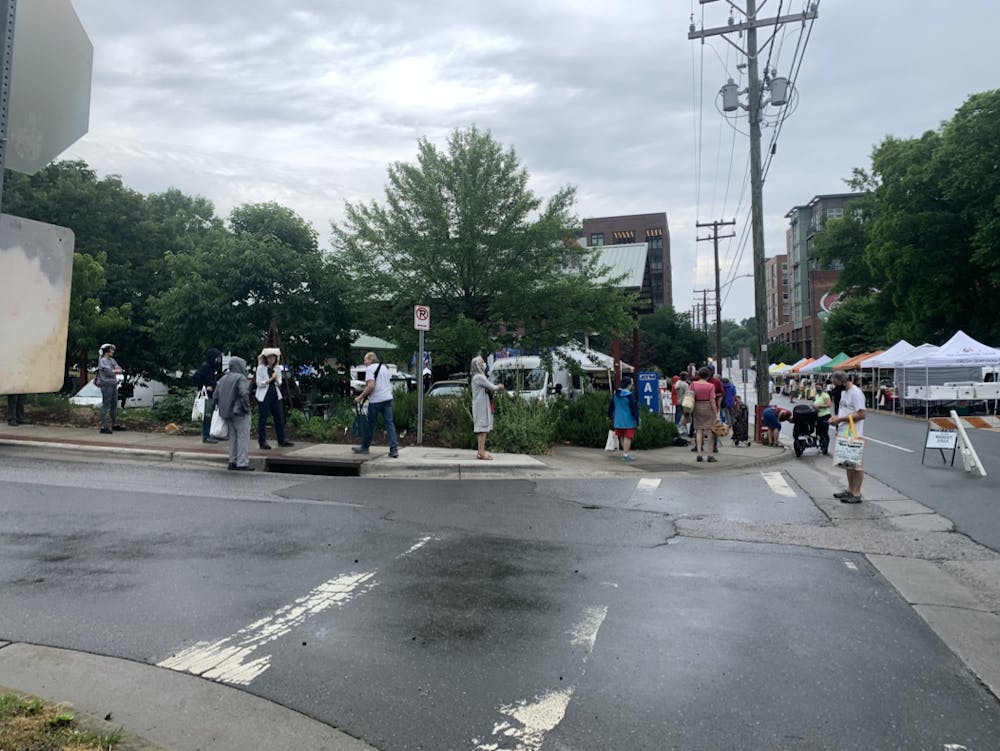
8:01 a.m.
Suddenly, a loud bell rings. A man down the line shouts, “There we go!”
People start flooding into the market. A man in a red shirt standing on the corner of the sidewalk heartily greets “Good morning!” to all arrivers. Vendors are already busy, talking to customers who approach their stands. “Hi, how are y’all?” says a lady selling plants.
I take note of all the vendors I pass: Gloria’s Glorious Goat Milk Fudge, Fruchtenicht Honey, Roberson Creek Farm, Soul Cocina, Wild Scallions Farm, Botanist & Barrel, Boxcarr Handmade Cheese.
Candles, prints, eggs, gourd birdhouses, houseplants, photos, handmade cheese. Every stand is something new. I buy a bag of five peaches for five dollars as the Kalawi Farms vendor sets the fresh fruit out onto their table. I grab a bag of green beans before checking out as well.
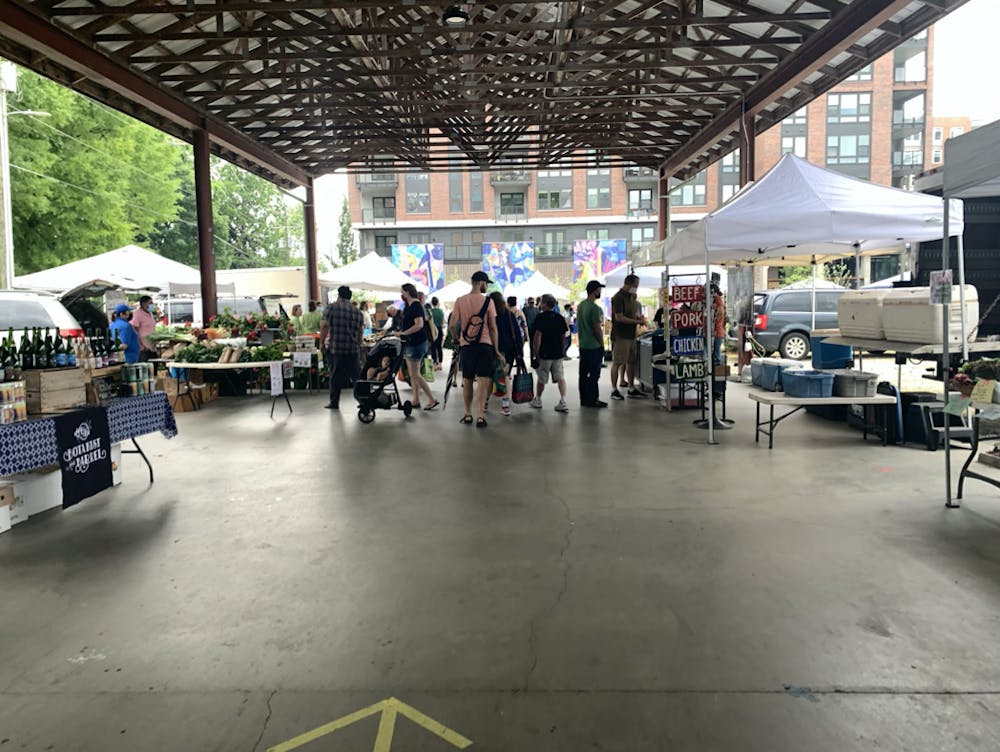
8:08 a.m.
It has been less than 10 minutes, but the market is already bustling. Lines have started to snake behind popular vendors’ stations.
I enter a pavilion where white tents are pitched up and down the area. Despite my gut telling me that I don’t need to add a fifth jewelry dish to my collection, I am so impressed by the creativity of the market’s artists that I pick up a pretty blue and purple one from Sarah Howe, who runs Sarah’s House of Clay.
Nearby, I hear a lady tell one young male vendor, “It’s nice to see unmasked faces!”
As I walk out from under the pavilion, I pass a man playing a guitar and singing for passing shoppers. He has a kazoo held around his neck and a tambourine fastened around his shoe so that he can tap his foot along to the beat. There is an open guitar case on the ground in front of him along with a sign which reads, “Genuine Durham Toe-Tapping: Happy Chad, the one man band.”
8:30 a.m.
I find myself next at the Honeygirl Meadery tent. Here I talk to an employee named Dakota, and he tells me that ahead of lifting restrictions people are excited to be shopping at the market again. He says that before people weren’t sure if they wanted to be out, but now there is enthusiasm from both the public and vendors.
“Honeygirl has always been at the Farmers’ Market as long as they’ve been around,” Dakota says. “The position of the market is very important to us. We wanted to make sure we were out participating in the community. [The owner of the company] Diane [Currier] is on the board, so this is something very close to our heart.”
Before thanking him for his time, I tell Dakota that although I would like to support their business, I unfortunately cannot due to my age. This makes him laugh.
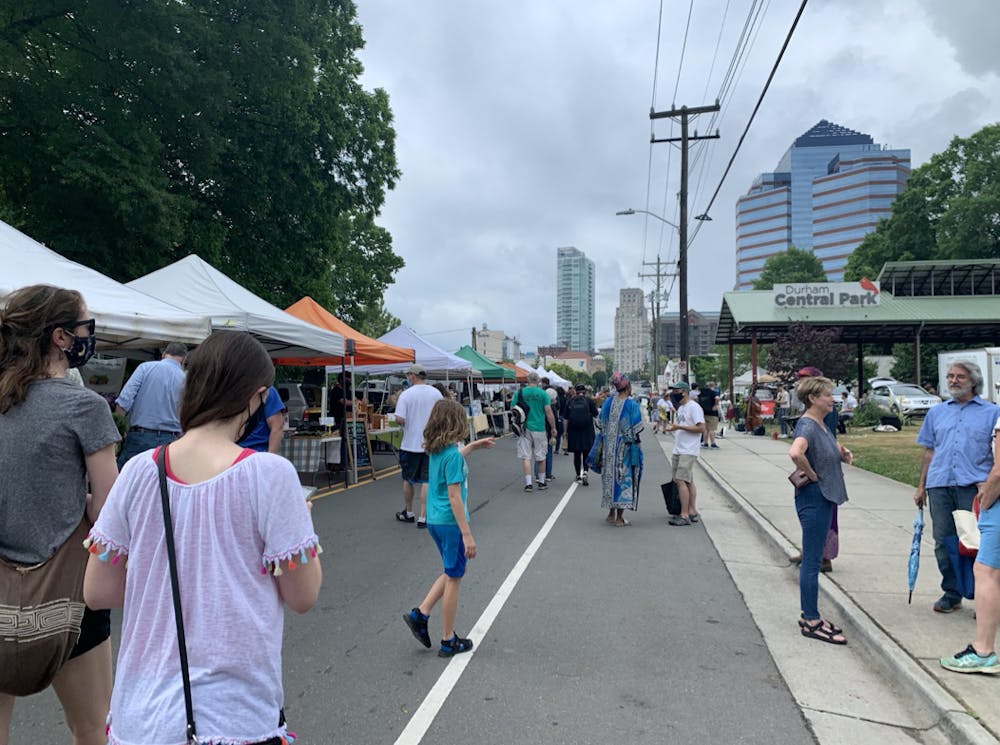
8:43 a.m.
The grey clouds finally give way as it starts to sprinkle. Despite the rain, the market stays busy.
I venture across the street, away from the pavilion and closer to the parking lot. There I find Williams Workshop, a tent featuring beautiful wooden cutting boards, rolling pins and spinning tops.
Chris Williams and his two young daughters are sitting in lawn chairs behind the table.
Williams says he started his workshop because he grew up working for his family’s business, so he wanted his kids to have the same opportunity. He likes woodworking, so he is hoping that as his kids help out he can give them “the 100-level business experiences” so they can think about where money comes from and what they want to produce.
Pointing to the spinning tops, he says that one of his kids was the genius behind the multiple colors of wood.
“We do things every day, over and over, and why shouldn't we be able to have really beautiful things to do those daily things all the time?” Williams says.
He says he works hard in the testing and making process to ensure his products will last a long time under regular use. His goal is to make pieces that will last multi generations.
“My dad has a cutting board that his dad made, and it's been in active use for about 45 years,” Williams says. “I'll probably inherit that if I'm lucky enough when that day comes because it'll still be just fine.”
Williams tells me he started with the Farmers’ Market after he moved from Las Vegas a few years ago.
“We started looking for places where we could try to interact and meet people,” Williams says. “We came down and we have really enjoyed it since then.”
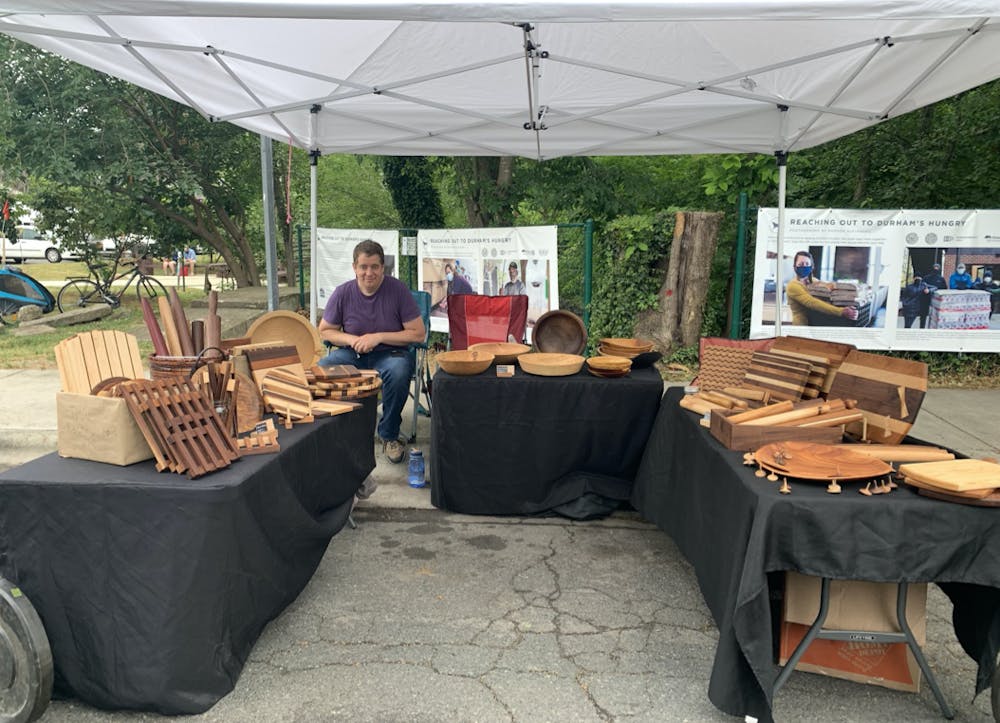
9:00 a.m.
It’s been an hour since the market has opened, and there has been a tangible increase in humidity. The market is still just as busy; conversations flit through the air and strollers roll on the cement floor.
I visit a vendor tent full of adorable, colorful pillows with animals sewn onto them. The owner of the tent, Marianne Donohue, happily explains her art to me.
Donohue tells me that her business is called Frances and Me. She says that Frances is her mother’s name. She was the one who taught Donohue how to sew.
Donohue says she gets inspiration for her pillows by seeing animals that she likes. Her business has grown by requests such as, “Hey, can you make a walrus?”
Although the monkey is her favorite animal to sew, her biggest seller is the fox. From start to finish, making a pillow takes her about one hour if she has a pattern. Often, she creates an assembly line with 10 pillows at a time to make the process more efficient.
Donohue attends two to three Farmers’ Markets a month to get out and “see people, talk to people, and sell a little.” She tells me how nice it is to be out with people after COVID-19 canceled many markets and how glad she is that markets started back up again.
“I love this area. People are so friendly,” Donohue says. “I know a lot of vendors—you see people every week and get used to seeing them and get to know them.”
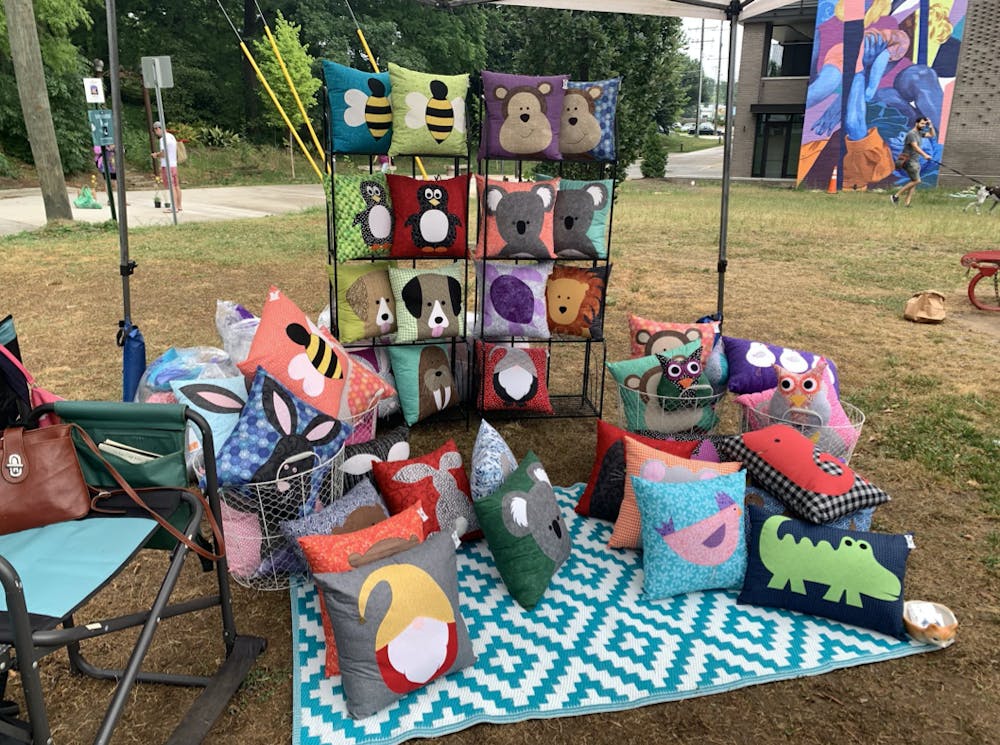
9:15 a.m.
After almost two hours, the sun finally peeks through the clouds, giving everyone something to celebrate.
Along the main strip of tents on the street, a jazz band is setting up with a saxophone, drums, trombone, and bass. The saxophone plays a few notes at first to test the sound, and then the band plays together and the music picks up.
Allison Wattenbarger and Heidi Biermann, both doctorate students at the Duke Divinity School, stand in the grassy area between the tents holding coffee and enjoying the jazz performance.
“We usually stop and look at the flowers, and today there was live music for the first time, so we decided to get some coffee and just listen for a bit.”
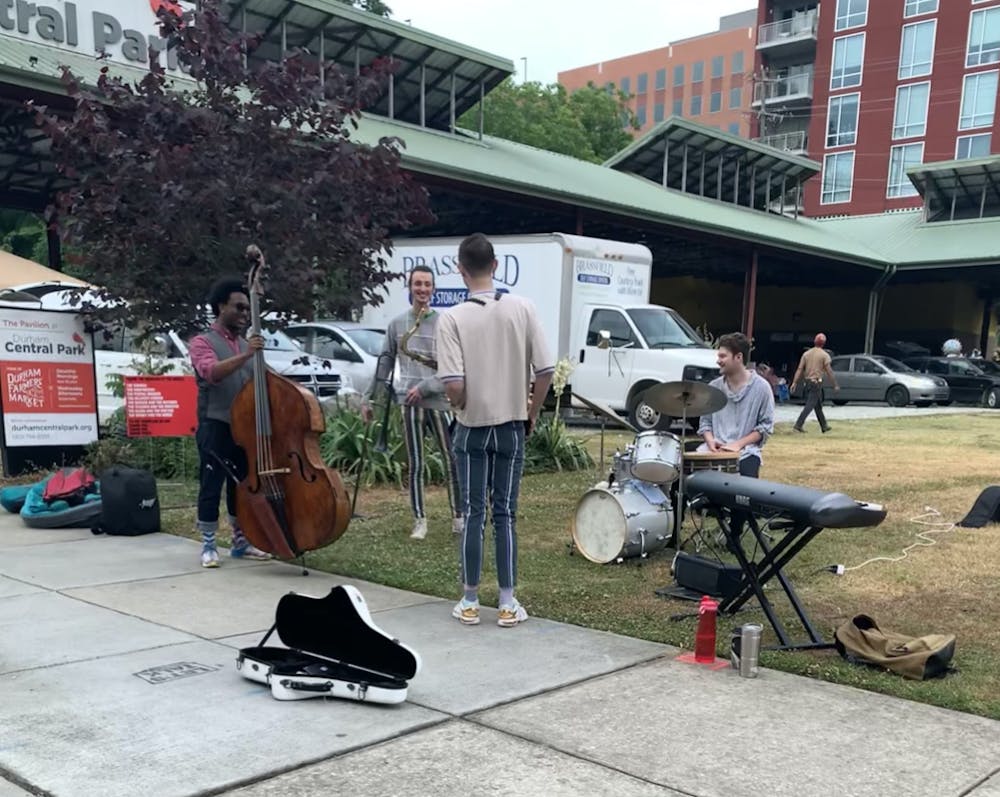
10:00 a.m.
As I prepare to leave the market, I walk one last lap around the circle. The jazz band has grown louder, and the saxophone player is engrossed in his music, bobbing his head and concentrating on each note of his solo.
Get The Chronicle straight to your inbox
Signup for our weekly newsletter. Cancel at any time.
Alison Korn is a Pratt junior and enterprise editor of The Chronicle's 118th volume.
